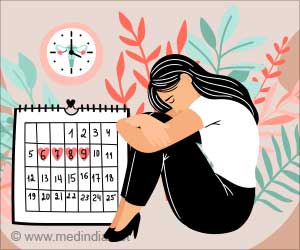
Because of the psychological burden – pandemic-related stress and sleep disturbances, the
(reproductive health) are greatly halted.
interrupts almost everybody’s functions. It is known that
also lead to sleep and body weight disturbances.
Pandemic and Reproductive Health: The Study
The study investigated the pandemic effect on reproductive health in April 2021 through a survey from 1,300 women.
The survey included standard measures of anxiety, depression, sleep quality, and menstrual cycles. Disturbances in menstrual cycles included painful or heavy periods, irregular or missed periods, and pre-menstrual symptoms
Changes in menstrual cycles were reported by 56% of the participants, worsened pre-menstrual symptoms by 64%, and reduced sex drive by 54% since the start of the pandemic.
Mental Health and Menstrual Cycle
In addition, the participants (women of reproductive age) also reported almost a double rise in severe depression, anxiety, and poor sleep as compared to their pre-pandemic levels.
These increased planes of mental distress along with poor sleep were interrelated with menstrual cycle disturbances as stated by the participants.
“Our findings highlight a real need to provide appropriate medical care and mental health support to women affected by menstrual disturbance, given the unprecedented psychological burden associated with the pandemic,” says Dr. Michelle Maher who was a part of the research team.
READ RELATED: Cancer symptoms: Three key indications you might have skin cancer
First of a Kind
The present study for the first time demonstrates that even after one year into the pandemic, the reproductive health disturbances continue to prevail among the women, alongside heightened psychological distress, and poor sleep.
The findings thereby warrant additional medical and psychological support for affected women. However, further studies are essential to explore the longer-term impact of the pandemic on female reproductive health for guidance to future health policy and practices.
“This study was conducted at a relatively early stage of the COVID-19 vaccination programme, so the length of the pandemic and effectiveness of the vaccine may influence future findings, further investigation with objective, measurable data is needed,” says Dr. Maher.
Support to Women
To govern and recognize the further progress of longer-term effects of these stressors on mental health and female reproductive health, the study team anticipates conducting these surveys at 6-month intervals.
The survey also plans to extend its coverage on further objective measurements of weight, blood pressure, sex hormone levels, and ovulation from the participating women.
“We would encourage women experiencing any reproductive disturbances such as (irregular, missed periods, painful or heavy periods, PMS or reduced sex drive) as well as mental health disturbances (including symptoms of low mood, anxiety, stress and poor sleep) to see their GP for advice. We are planning to provide support for women affected by menstrual cycle abnormalities by developing psychological support workshops at our centre”, says Dr. Maher.
Reference:
- Reproductive health disturbance in the era of the COVID-19 pandemic – (https://www.endocrine-abstracts.org/ea/0077/ea0077p234)
Source: Medindia
Source:








